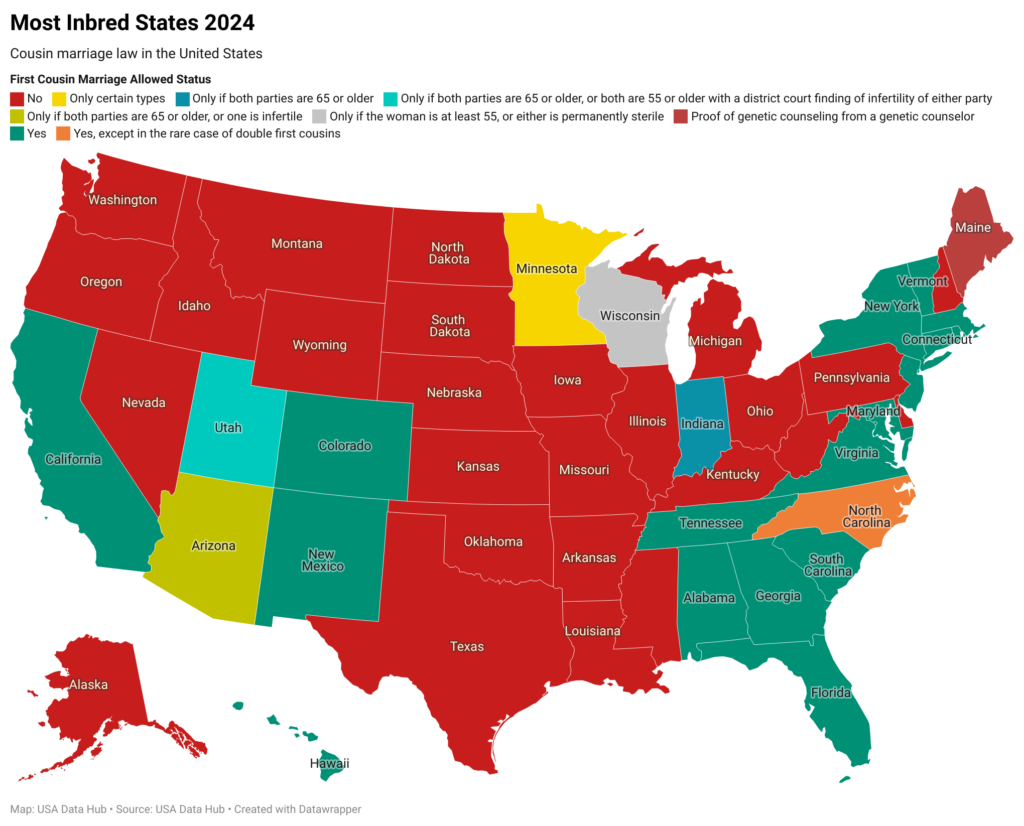
In the US, marrying relatives, known as inbreeding, is not common, with only about 0.2 percent of American marriages involving relatives. This amounts to approximately 250,000 individuals. Even though marrying cousins, which is a type of inbreeding, is legal in 19 states, it’s not widely practiced.
19 states where Inbreeding is legal are
- Alabama
- California
- Colorado
- Connecticut
- District of Columbia
- Florida
- Georgia
- Hawaii
- Maryland
- Massachusetts
- New Jersey
- New Mexico
- New York
- Rhode Island
- South Carolina
- Tennessee
- Vermont
- Virginia
These states legally permit first cousin marriage.
Researchers at the University of Queensland examined 450,000 genomes of people of European ancestry born between 1938 and 1967. From this group, they identified 125 individuals who met the criteria for inbreeding, indicating that their parents were either siblings or close relatives. Among these individuals, the researchers observed several common health problems, including reduced cognitive abilities and muscle function, shorter stature, weaker lung function, and an increased susceptibility to various diseases.
| State | First Cousin Marriage Allowed | First Cousin Sexual Relations Allowed | Adopted Cousin Marriage Allowed |
| Alabama | Yes | Yes | |
| Alaska | No | Yes | Yes |
| Arizona | Only if both parties are 65 or older, or one is infertile | No | Yes |
| Arkansas | No | Yes | Unknown |
| California | Yes | Yes | Yes |
| Colorado | Yes | Yes | Yes |
| Connecticut | Yes | Yes | Yes |
| Delaware | No | Yes | Unknown |
| District of Columbia | Yes | Yes | Yes |
| Florida | Yes | Yes | Yes |
| Georgia | Yes | Yes | Yes |
| Hawaii | Yes | Yes | Yes |
| Idaho | No | Yes | Unknown |
| Illinois | No | No | Unknown |
| Indiana | Only if both parties are 65 or older | Yes | Yes |
| Iowa | No | Yes | Unknown |
| Kansas | No | Yes | Unknown |
| Kentucky | No | No | Unknown |
| Louisiana | No | Yes | If judicial approval in writing is obtained |
| Maine | Proof of genetic counseling from a genetic counselor | Yes | Yes |
| Maryland | Yes | Yes | Yes |
| Massachusetts | Yes | Yes | Yes |
| Michigan | No | Sexual conduct with a cousin who is mentally disabled, incapable, or incapacitated, physically helpless, or developmentally disabled due to autism, cerebral palsy, epilepsy, or intellectual disability is a felony | Unknown |
| Minnesota | Only certain types | Yes | Unknown |
| Mississippi | No | No | Yes |
| Missouri | No | Yes | Unknown |
| Montana | No | Yes | Unknown |
| Nebraska | No | Yes | Yes |
| Nevada | No | No | Unknown |
| New Hampshire | No | Yes | No |
| New Jersey | Yes | Yes | Yes |
| New Mexico | Yes | Yes | Yes |
| New York | Yes | Yes | Yes |
| North Carolina | Yes, except in the rare case of double first cousins | Yes | Unknown |
| North Dakota | No | No | Unknown |
| Ohio | No | Yes | Unknown |
| Oklahoma | No | Yes | Unknown |
| Oregon | No | Yes | Yes |
| Pennsylvania | No | Yes | Unknown |
| Rhode Island | Yes | Yes | Yes |
| South Carolina | Yes | Yes | Yes |
| South Dakota | No | No | Unknown |
| Tennessee | Yes | Yes | Yes |
| Texas | No | No | No |
| Utah | Only if both parties are 65 or older, or both are 55 or older with a district court finding of infertility of either party | No | Unknown |
| Vermont | Yes | Yes | Yes |
| Virginia | Yes | Yes | Yes |
| Washington | No | Yes | Unknown |
| West Virginia | No | Yes | Yes |
| Wisconsin | Only if the woman is at least 55, or either is permanently sterile | No | Yes |
| Wyoming | No | Yes |
FAQ
- Which are the Top 10 Most Inbred States? Top 10 most inbred states are Washington, Oregon, Montana, South Dakota, New Mexico, Oklahoma, Arkansas, Louisiana, Indiana, and Kentucky.
- Are first cousins allowed to marry? In 24 states, it’s not allowed to marry your first cousin. In 20 states and Washington, D.C., cousins can marry without any restrictions. And in six states, first cousins can marry only if certain conditions are met.
- What is the closest cousin you can marry legally? In the United States, you can marry your second cousin in every state. But when it comes to marrying your first cousin, it’s only legal in about half of the states. Whether you can marry a cousin or half-sibling depends on the laws where you live and what you and your family believe.
Source:
https://en.wikipedia.org/wiki/Cousin_marriage_law_in_the_United_States
